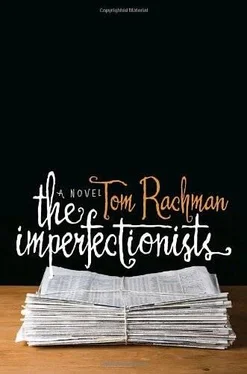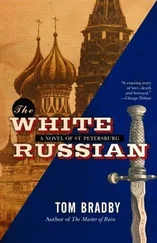At Fiumicino Airport the next day, Jimmy mentions that he may move back to Arizona. His adopted daughter, now in her thirties, has a place in Tempe. She works in real estate and lives alone. She'd enjoy the company.
As Herman listens, he envisions this life for his fading friend. He and Jimmy are not, as Herman has always believed, gradations of the same man-he the middling version and Jimmy the superlative one. They are utterly different: Herman would never move in with his daughter, would never let himself fall insolvent at age sixty-five, and never need a place to stay. Even now, the notion of retirement is preposterous to him-his fingers still jab far too well, poking that paper to credibility.
They part at airport security and Herman walks toward the exit, but he pauses at the sliding doors. Perhaps Jimmy still needs him for something. What if there's a problem?
He turns back and spots his old friend in the security line. Jimmy hauls his carry-on luggage, jacket slung over his forearm. He yawns-he never did get over the jet lag. He is jostled from behind and scratches his forehead testily, muttering. He has little hair left, a dusting of snow above each ear. His eyelids hang heavy, his ears are long. How Herman has adored provoking laughter from that face over the years! And how thin it has become. A spindly neck knocking around inside a collar, an abdomen retreating into a spine. The security line inches forward until it is Jimmy's turn. With difficulty, he heaves his bag onto the conveyor belt and Herman's shoulders strain involuntarily as if to help the bag up there. Jimmy raises his arms to be scanned, collects his bag, walks out of sight.
Herman drives the blue Mazda slowly home to Monteverde. He finds himself considering it all: Miriam (he smiles), their daughter (what a fine young woman), their grandchildren (each has such a different personality), these extraordinary years in Rome (Miriam was right about us moving here), his satisfaction at the paper (I've been useful). All this has been the most extraordinary surprise; he had expected an unhappy life, yet ended up with the opposite. It's barely credible.
When Miriam arrives home, she raves about the trip to Philadelphia and shows off all the photos on her digital camera. They are so wrapped up in talking about the grandkids that they hardly discuss Jimmy's stay. She turns to Herman on the sofa-they are sitting side by side.
"What?" he asks suspiciously. "What is it?"
"I was just thinking how handsome you are."
"How fat, you mean."
"No," she says. "Handsome." She kisses his cheek, then his lips. "You are. And I'm not the only one who thinks so, either."
"So I've got admirers now?"
"I'm not about to tell you, am I. You might run off."
"I made soup, by the way."
"Yes," she says, amused. "I know."
A couple of months later, Herman receives an email from Jimmy. It is long and rambling, full of philosophizing and poetic citations. Which is another way of saying he's in splendid spirits with his daughter in Tempe, Arizona.
The email, for no reason Herman can articulate, upsets him. He sees no reason to write back, and perhaps that is why.
1960. AVENTINE HILL, ROME
Ott opened his copy of the paper across the dining-room table and touched a finger to his tongue, which was dry from all the medication the doctors had him on. He flipped the pages: Eichmann caught in Argentina, African colonies declaring independence, Kennedy running for president.
He was proud of what the paper had become but sorry to read it here in his mansion and not in the office, among his staff. He had not visited Corso Vittorio in weeks. He'd told Betty and Leo that he was traveling in the United States; he'd told his family in Atlanta that he was on the road in Italy. The only travel he did, however, was to clinics in London and Geneva.
His symptoms had been worsening for months: blood, pain, exhaustion. He came to despise his bathroom in the mansion, all the intimate revulsions awaiting him there. He had the cooks prepare steak, eggs, liver pate, but still he grew thinner.
A surgeon in London cut out half of Ott's cancerous insides, but the procedure did no good. On his return to the mansion, he ordered the servants away. A delivery boy dropped each day's paper outside the gate; a maid left him food. Otherwise, he was on his own.
He washed in the bathtub, soap bar bruising his skin, bumping bones beneath. He climbed out, arms straining on the rim of the tub. In the fogged mirror, he caught sight of himself, thick white towel around jagged hips. He was dying.
He walked across the mansion, bathwater dripping off him, over the floorboards, up the stairs to the second floor. Cautiously, he lowered himself into the chair at his desk-no buttock flesh to cushion him anymore-and opened his letter pad.
The first note he addressed to his wife and son, whom he had left in Atlanta years earlier. "Dear Jeanne and Boyd," he wrote. "The important thing to realize, and I need to make this clear."
His pen hung above the line.
He glanced at the wall, at one of the paintings Betty had chosen, the Turner. He approached it and reached behind himself, as if to take her wrist, to lead her closer. "Tell me about this one. I don't understand it. Explain it to me."
He returned to his desk and started a new letter. It was time, he decided, to explain matters.
As days passed, copies of the paper piled up outside the mansion. The maid who left Ott's meals noticed that they were not being consumed. She unlocked the mansion. "Mister Ott?" she called out. "Mister Ott?"
His family in Atlanta, against all evidence, had always expected him to return. Now they could not even retrieve his body. Legally, there was no way: his will specified burial in the Protestant Cemetery in Rome. They refused to believe this had been his wish and boycotted the funeral in Italy, holding an alternative service in Atlanta.
The paper came out with a black border around page one, accompanied by a front-page editor's note in tribute to the founding publisher. Leo sent Ott's brother, Charles, a letter of condolence (he did not respond), then followed up with a polite entreaty that the paper be allowed to survive. Again, Charles-now chairman of the Ott board-did not respond. Nor did he halt funding.
Six anxious months passed before Charles announced that he was coming for a visit. On arrival, he shook hands coldly with Leo and ignored Betty altogether. He made one demand-that at the top of the masthead, in bold print and in perpetuity, it state: "Founded by Cyrus Ott (1899-1960)." Betty and Leo heartily endorsed the idea.
"This is an enterprise that mattered a great deal to my younger brother," Charles said. "Letting it end now would be, I believe, a smear on his memory."
"I thoroughly agree," Leo said.
"How many copies do you people sell?"
"Around fifteen thousand on a good day."
"Well, I want more. I want my brother's name in front of as many eyes as possible. It may not mean much in the grand scheme, but it does mean something to me and to my family."
"We were extremely fond of him," Betty said.
This irked Charles for some reason. He concluded the conversation and went into the newsroom to address the staff.
"Putting out the paper each day is your business," he told them. "But that the paper gets put out-this is my business. I consider the enterprise to be a standing memorial to my brother, and it'll keep standing as far as I'm concerned."
The staff, seeing that he had finished, broke into applause.
"U.S. GENERAL OPTIMISTIC ON WAR"
EDITOR-IN-CHIEF-KATHLEEN SOLSON
W HEN SHE REALIZES THAT NIGEL IS HAVING AN AFFAIR, HER FIRST sentiment is satisfaction that she figured it out. Her second is that, despite all the palaver about betrayal, it doesn't feel so terrible. This is pleasing-it demonstrates a certain sophistication. She wonders if his fling might even serve her. In principle, she could leave him without compunction now, though she doesn't wish to. It also frees her from guilt about any infidelities she might wish to engage in. All in all, his affair might prove useful.
Читать дальше












